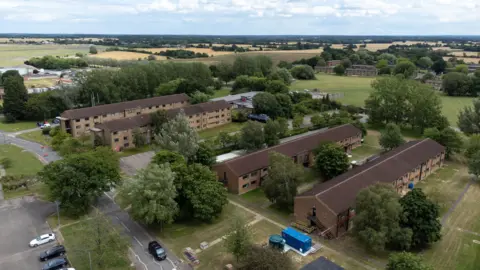In recent developments, the Home Office has announced plans to escalate the accommodation capacity at MDP Wethersfield, a former Royal Air Force (RAF) station situated in Essex, by 50%. This facility has been sheltering hundreds of single male asylum seekers since July 2023. The number of individuals currently residing there is approximately 800. However, officials from Braintree District Council indicate that this figure is anticipated to rise significantly, reaching 1,245 by the end of July.
The operational procedure concerning the use of MDP Wethersfield has been affirmed by a spokesperson from the Home Office. They emphasized that all undertakings involving property or sites owned by the department are conducted in strict accordance with the relevant planning permissions. This underscores the Home Office’s commitment to ensuring that the expansion of migrant accommodation adheres to legal frameworks.
Furthermore, the council has projected an influx of around 60 new arrivals each week at the Wethersfield site. As a result, it has become the location housing the largest number of asylum seekers across the UK. This statistic reflects the increased pressure on local infrastructure and resources, particularly given the ongoing global migration challenges.
The likelihood of accommodating more asylum seekers at Wethersfield comes amidst broader discussions on the UK’s immigration policies. The Home Office is implementing these changes in response to the unprecedented rise in small boat crossings since the beginning of 2023, which has prompted the government to seek solutions to manage the escalating number of arrivals. Notably, among those accommodated at MDP Wethersfield are predominantly single adult males, many of whom reached the UK via perilous maritime routes.
A recent correspondence from the Home Office to residents living near the former RAF site assured that the additional bed spaces would only be used temporarily, pending the ability of the broader accommodation estate to handle demand effectively. The anticipation of the migrant population at Wethersfield decreasing back to the initial 800 by October has also been communicated, hinting at a more dynamic approach to handling asylum accommodation in the region.
Local government figures such as Graham Butland, the Conservative leader of Braintree Council, have characterized the influx of asylum seekers as a direct result of record numbers of small boat arrivals. In light of the escalating situation, he has also expressed concerns regarding the suitability of using military accommodations and various protest movements have emerged among residents and asylum seekers alike, questioning the conditions and management at the site.
Continued oversight and accountability from local authorities have been prioritized, as Butland mentioned their commitment to ensure safety and integration between the asylum seekers and the local community.
Moreover, the Home Office has reported a significant revision in its accommodation strategy, highlighting that the utilization of hotels to house asylum seekers has sharply decreased, from over 400 placements in 2023 to less than 210. This strategic shift towards using sites like MDP Wethersfield is part of the ongoing effort to streamline facilities for newcomers while providing a structured approach to asylum management within the UK.
High-profile comments have been offered by former government leaders such as James Cleverly, the former Tory home secretary, who suggested that utilizing hotels would not only be more effective but potentially more cost-efficient than military accommodations. This sentiment reflects a lingering debate on the most effective means to deal with emergency housing for asylum seekers.
In conclusion, the increasing numbers of migrants at MDP Wethersfield encapsulate a complex interplay of immigration pressures, local governance, and national policy responses. As Essex continues to grapple with the challenges posed by rising asylum seeker numbers, the implications for both the individuals seeking refuge and the local communities are profound and continuing to evolve. The situation demands prompt and judicious management to ensure outcomes that prioritize safety, dignity, and the successful integration of those in need.











